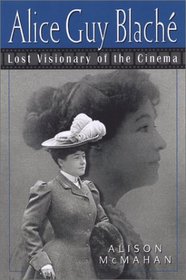Search -
Alice Guy Blache: Lost Visionary of the Cinema
Alice Guy Blache Lost Visionary of the Cinema
Author:
‘The time has arrived, so it would seem, when woman must take her place beside man in the majority of arts and professions in the business world. In women of the caliber of Madame Alice Blaché it has also been demonstrated that there is a possibility of their doing so without being shorn of that most desirable of womanly qualities, fem... more »
Author:
‘The time has arrived, so it would seem, when woman must take her place beside man in the majority of arts and professions in the business world. In women of the caliber of Madame Alice Blaché it has also been demonstrated that there is a possibility of their doing so without being shorn of that most desirable of womanly qualities, fem... more »
ISBN-13: 9780826451583
ISBN-10: 0826451586
Publication Date: 3/2002
Pages: 384
Rating: ?
ISBN-10: 0826451586
Publication Date: 3/2002
Pages: 384
Rating: ?
0 stars, based on 0 rating
Publisher: Continuum International Publishing Group
Book Type: Hardcover
Other Versions: Paperback
Members Wishing: 1
Reviews: Amazon | Write a Review
Book Type: Hardcover
Other Versions: Paperback
Members Wishing: 1
Reviews: Amazon | Write a Review
Genres:
- Biographies & Memoirs >> Arts & Literature >> Entertainers
- Biographies & Memoirs >> Arts & Literature >> Movie Directors
- Biographies & Memoirs >> General
- Biographies & Memoirs >> Specific Groups >> Women
- History >> Europe >> France >> General
- Nonfiction >> Women's Studies >> History
- Humor & Entertainment >> Movies >> Direction & Production
- Humor & Entertainment >> Movies >> History & Criticism




